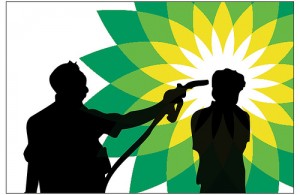WASHINGTON — The leaking oil that has tainted the Gulf of Mexico is also threatening the political shores on both sides of the Atlantic, with a British company the villain.
President Barack Obama and British Prime Minister David Cameron planned to discuss the environmental catastrophe over the telephone on Saturday, hoping to ease what has become a growing rift over the criticism of the well’s owner, BP PLC.
Obama has sharpened his criticism of BP as the company struggles to halt the gushing oil at the bottom of the Gulf. Cameron is under pressure at home to get Obama to tone it down amid complaints that the heated rhetoric will have severe implications the company and its investors.
The State Department has said American anger over BP’s handling of the disaster wouldn’t affect the relationship between the U.S. and Britain.
Obama has he would have fired BP’s top executive if he were in charge. He embraced the idea that the oil company suspend its quarterly dividend. He reproached BP for spending money on a public relations campaign. This past week, he said in a television interview, “I don’t sit around just talking to experts because this is a college seminar; we talk to these folks because they potentially have the best answers — so I know whose ass to kick.”
He occasionally refers to “British Petroleum,” although the company years ago began using only its initials and is a far-reaching international corporation with extensive holdings in the United States, including a Texas refinery and a share of the Alaska oil pipeline.
The angry words from Washington have produced a backlash in Britain, where BP is viewed as a corporate pillars. Millions of British retirees depend on BP dividends since pension funds are heavily invested in the oil company, the world’s third-largest.
Cameron has tried to find a middle ground. He has said he shares with Americans the “frustration” about not being able to halt the spill and concern about the environmental damage caused by the thousands of barrels of oil gushing from the BP well. But Cameron also views BP “as an economically important company” not only in the United Kingdom but also the United States and other countries, according to his office.
“It is in everyone’s interests that BP continues to be a financially strong and stable company,” Cameron has said.
British Treasury chief George Osborne, after meeting with BP executives, said Friday that his government understands U.S. concerns, but that Cameron “is also clear that we need constructive solutions and that we remember the economic value BP brings to people in Britain and America.”
BP’s stock has dropped by 40 percent since the oil rig fire on April 20 that unleashed the country’s worst oil spill. But stocks have rebounded somewhat in recent days. BP shares rose $1.19, or 3.6 percent, to close at $33.97 in New York on Friday.
The company’s board is expected to meet Monday to discuss deferring its second-quarter dividend and putting the money into escrow until the company’s liabilities from the spill are known.
BP’s chairman, Carl-Henric Svanberg, who has faced criticism for not being more visible in BP’s response to the Gulf spill, is to meet with Obama at the White House on Wednesday. Probably joining him will be accompanied by CEO Tony Hayward and other BP executives. It will be the first time Obama has met with BP officials since the crisis began.
Hayward will testify at a House hearing on Thursday.
 Thfire.com Everyday news that matters
Thfire.com Everyday news that matters 
